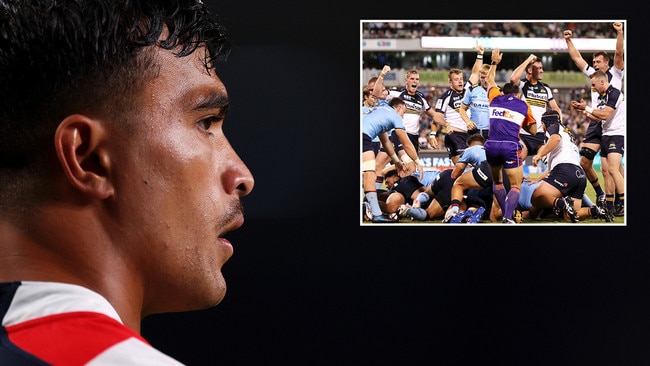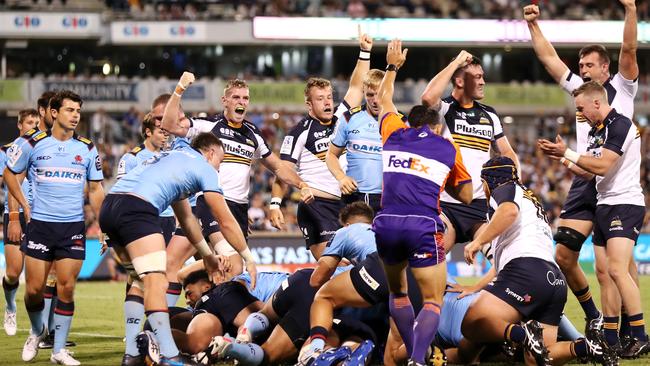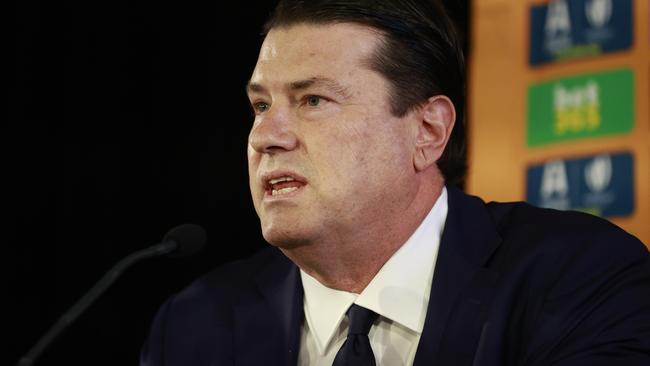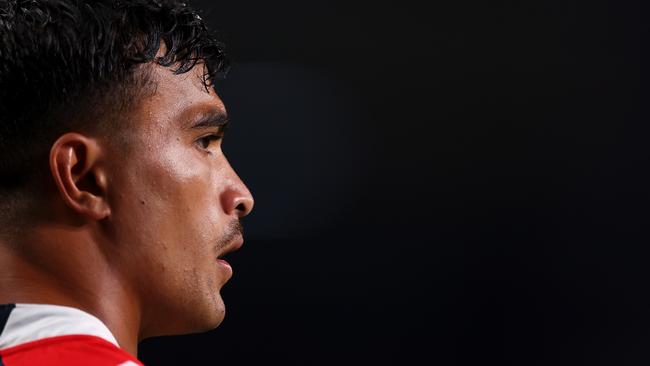Joseph-Aukuso Suaalii signing can’t solve ailing rugby’s biggest problem
Rugby Australia is celebrating the poaching of Joseph-Aukuso Suaalii, but marquee recruits cannot hide the demise of a once proud code writes PAUL KENT.

Rugby
Don't miss out on the headlines from Rugby. Followed categories will be added to My News.
A search party needs to be formed to urgently find the 800 million people Rugby Australia boss Hamish McLennan believes are awaiting Joseph-Aukuso Suaalii’s transition to rugby.
Rugby can ill-afford to let them continue going unnoticed for too much longer.
If we are dealing in real figures, then we can be sure McLennan’s 800 million fans included all 13 Waratahs supporters that drove from metropolitan Sydney last year, according to Brumbies ticket sales, to watch their team play the Brumbies.
Just 13.
Where the rest were only the chairman can tell. Hiding with millions of others apparently.
McLennan is about to get eaten alive by ARL Commission chairman Peter V’landys, a man who rarely needs an invitation but is taking particular delight in this one.
Here is McLennan talking about a world game when it is dying at home.
Rugby dramatically over-estimated its own value and eventually sold its broadcast rights for much less than what was originally offered, to a network that doesn’t want to televise it.
Rugby fans need a miner’s hat and a Gregory’s, it seems, to find their way to games.
But not even that is rugby’s biggest problem at the moment.

As McLennan celebrated the Suaalii coup and most of the rest of the rugby world scratched their heads in confusion, it emerges that the chairman secured the deal without consulting his administration.
Not even Eddie Jones knew about it. Jones’s input was no more stronger than responding to McLennan to say if Suaalii, 19, was available he should be considered.
It wouldn’t have surprised Jones: McLennan hired the coach the same way. While some will say he has hit two bullseyes, others fear a chairman acting outside of the board’s knowledge has potential for danger.
He is privately campaigning to be named World Rugby chairman by the time Australia hosts the 2027 World Cup.
It would surprise no-one that the New Zealand Rugby Union will vote for him and McLennan, through the goodness of his heart, might help the NZRU replace Australian Brendan Morris as the boss of SANZAR with a Kiwi.
For years now rugby has been in gradual decline, at least in Australia, becoming a second tier sport. The 2003 Rugby World Cup was the peak moment but in hindsight it became too much too soon. Then rugby boss John O’Neill emerged with a $40 million war chest — significantly more than the NRL had in the bank at the time — and declared with its new-found funds rugby was going to go after the NRL to become the dominant football code in eastern Australia.

A chief strategy was to reduce money spent on grassroots funding to concentrate money on elite pathways. It was the smart choice, went the sell.
Rather than squander money on part-time and weekend players with no future, rugby was going to identify the supreme talent at junior levels and put the money in to develop them all the way through to the elite game.
The problem with such a strategy, as any junior scout freely admits, is that talent identification is hardly a perfect business.
Kids that excel at 15 often fade by their 20s, having discovered girls or schooners or a combination of both.
On the flipside, the potential diamond in the rough is now close to an impossibility; his development long ago stopped without proper coaching that might have benefited once his body matured.
They often lose both ends.
Suaalii himself has proven how wrong the elite coaches can get after it emerged this week that Rugby Australia could have signed him on a three-year $100,000 a season deal as a 16-year-old, only to let him go to the NRL and now have to pay him massive overs to lure him back.
And in one of the few positions where the Wallabies already have considerable depth.
So McLennan was hardly troubleshooting when he poached Suaalii.
He was buying advertising for the code while fattening his own reputation.

As for the failing elite pathways strategy, it has overseen the continuing demise of the code.
The Sydney club rugby scene died through lack of funding, only to be brought back as a pale imitation of what it used to be, Brisbane rugby also faded, the other traditional breeding ground, the Wallabies are as an unrecognisable bunch of individuals as we have ever seen in a national team now that so many are poached from overseas, and the game and its complicated officiating have made it close to unwatchable.
For fans who once enjoyed the sport, the code has let them down.
And yet McLennan continues to agitate.
It wasn’t that long ago he was asking rugby players to take 60 per cent pay cuts to get through the Covid crisis, the players sacrificing money Rugby Australia apparently can find when it needs it.
The Roosters, meanwhile, will say nothing disparaging about Suaalii as disappointed as they are.
They know he will return to the NRL after the British and Irish Lions have toured and when life as a Wallaby becomes boring and something that 800 million fans, hiding behind trees, can’t fix.





